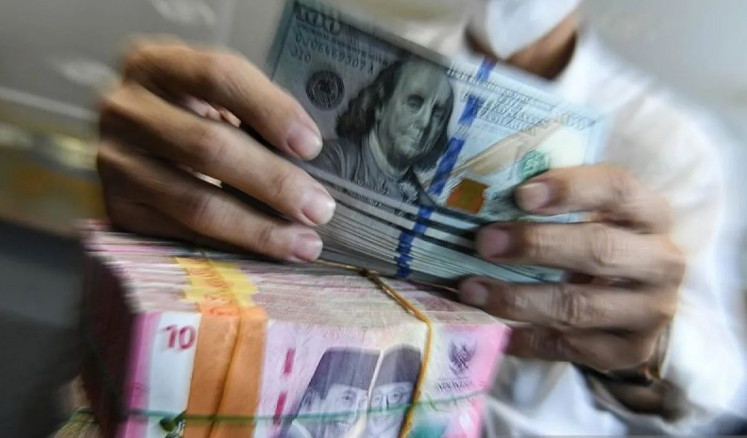Popular Reads
Top Results
Can't find what you're looking for?
View all search resultsPopular Reads
Top Results
Can't find what you're looking for?
View all search resultsMarket rebounds after collapses
The Indonesian stock market rebounded Tuesday after tumbling for the sixth consecutive day, as investors regained confidence after the government stepped in to avert havoc
Change text size
Gift Premium Articles
to Anyone
The Indonesian stock market rebounded Tuesday after tumbling for the sixth consecutive day, as investors regained confidence after the government stepped in to avert havoc.
The Composite Index rose slightly by 1 percent after heavy selling of commodity stocks sent it plunging by more than 7 percent in early trade. The Index rose 16.39 points to end at 1,735.63.
After the intraday session, President Susilo Bambang Yudhoyono stepped in to ease tension by reassuring businesses the national economy was well-managed and could endure the global turmoil resulting from the credit crunch in the United States.
"We should not panic as we did back in 1997 (when Indonesia was hit by the Asian financial crisis) because our fundamentals, at the national level, are good and well-managed," Yudhoyono said.
"I have ordered (the Finance Ministry and the central bank) to keep up good communication with businesses to maintain our economic stability. If we do that properly, I am sure we can manage any turbulence, globally or regionally."
He added it was important that authorities explained the situation to the public correctly to prevent speculation.
The Asian Development Bank on Tuesday raised its 2008 growth forecast for Indonesia to 6.2 percent from the 6 percent previously estimated due to the strong economic foundation that enabled the country to record accelerating growth in the second quarter.
Bank Indonesia (BI) took another step to ease panic selling in the equity and the rupiah-denominated assets by cutting its overnight lending rate from 12.25 percent to 10.25 percent to help pump liquidity into the market.
The move helped the market weather the turmoil with bank stocks saving the day. Bank BRI, Indonesia's third largest bank by assets, gained 7.3 percent to Rp 5,150, while Bank BCA, the second largest lender, jumped 4.7 percent to Rp 2,775.
"The government and BI will keep a close eye on the situation. What is happening in the world now is a result of global imbalances over the past decade," Finance Minister Sri Mulyani Indrawati said.
"The global economy has very large adjustments to make ... In the process, there will be some back and forth, including speculation."
Mandiri Sekuritas analyst Ari Pitoyo said the recent heavy losses in the equity market were mainly due to its dependence on commodity-based stocks, which account for more than 30 percent of the market.
"As the oil prices go down, other commodities will follow," he said.
The high interest rate also contributed to the jitters over a possible slowdown in the economy as firms put the brakes on expansion plans because of the higher cost of borrowing, he added.
Meanwhile, the rupiah continued its slump by trading at 9,470 to the U.S. dollar, as against 9,435 on Monday.
But Mulyani said the performance of the rupiah was not as bad as many had expected.
"The rupiah's performance, regionally, is not bad. As of September, the (Korean) won has dropped 19 percent, India (rupee) 15 percent, (Philippines) peso 12.7 percent, while the rupiah just 0.8 percent, meaning the volatility is less," she said.
The government pledged to unload its Rp 120 trillion ($12.76 billion) of idle funds held by BI to help spur economic activity. (additional reporting by Ika Krismantari)










